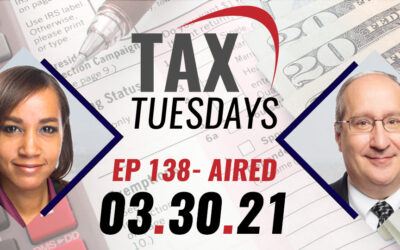Day Trader? Read This Guide to Avoid Unnecessary Day Trading Taxes
In this episode of Toni Talks, enrolled agent (EA) Toni Covey is joined by special guests Sergey Garayants, Esq. and Gary McHenry, CPA, to discuss how day traders can avoid overpaying their taxes.
Updated November 30, 2020
Day trading on the stock market involves capitalizing on the rise and fall of stock prices. A day trader hopes that these trades will result in a net profit over the course of a year, which of course means they’ll need to pay taxes on them.
3 Tax Strategies to Save on Day Trading Taxes
- Trading Expense Deductions
- Mark-to-Market Accounting
- Tax Loss Harvesting
People who are employed and receive a paycheck can’t do much by way of avoiding taxes, other than making pre-tax contributions to a retirement account, like a 401(k) or IRA. They can also squirrel away some of their earnings in a health savings account, but these strategies are fairly limited in terms of reducing a tax burden.
Self-employed individuals, however, can use other strategies to reduce their overall tax burden. Self-employed individuals include professionals such as entrepreneurs, real estate investors, business owners, and stock market day traders.
Unfortunately, day trading as a business activity is in somewhat of a twilight zone when it comes to tax status. The IRS will not even consider someone a day trader unless they meet certain criteria.
Who is a Day Trader?
Who qualifies as a day trader? Is it anyone who buys and sells stock on the internet? No, and in most cases, the average consumer will face limitations regarding how often they can buy and sell stocks due to regulations imposed by the Securities and Exchange Commission (SEC). One of these regulations is that a day trader must maintain minimum account equity of $25,000.
In any case, a day trader is not a day trader by IRS standards unless they clearly intended to profit from trading activities through the performance of substantial trading activity, through which they engage on a frequent and regular basis. These factors are further assessed by how long you hold on to the securities you purchase, how much money you spend on trades, how many trades you place per year, and the amount of time you devote to day trading.
These requirements are a bit ambiguous, and like many ambiguous points of law, they have been clarified in court precedents. Generally speaking, if you make four trades per day, 15 per week, or 60 per month, you can be considered a day trader. If you engage in day trading three-quarters of the year, avoid holding securities for more than 31 days, and earn a substantial amount of your income from day trading, you can be considered a day trader.
You must also be set up to run as a legal business entity, which would include, for instance, investing in services like analytical software and small business bookkeeping services.
3 Tax Strategies to Save on Day Trading Taxes
Trading Expense Deductions
If the IRS considers you a day trader, you can make business expense deductions when you file your taxes, a standard strategy for reducing your tax burden. These deductions might include a home office or a rented office space, the cost of equipment, accounting costs, software (like software that analyzes the market), and ancillary expenses, such as interest from loans. Like any form of self employment or business, writing off these investment expenses is a much appreciated accounting opportunity that makes business possible.
While some businesses need a minimal amount of equipment, this may not be true for day traders. Purchasing stock market analyzing software may cost as little as $20 per month for a subscription, but if a serious day trader wants to build their own proprietary software (and many serious traders do) that could cost up to six figures in research and programming. At the same time, structured correctly, that could be a business expense a day trader can write off over the course of a few years.
Mark-to-Market Accounting
If you are categorized as a day trader by the IRS, you can benefit from a tax filing selection called mark to market accounting. This essentially means that you report all your annual gains and losses as if you sold everything on the last day of the year. Net losses can be accounted against your income on an unlimited basis, unlike the $3,000 limit applicable to normal taxpayers who pay taxes on ordinary income.
However, the money that you do make from day trading will fall into a short term capital gain tax rate as taxable income, instead of being treated as long term capital gains. The numbers on these tax rates change every few years according to the political landscape, but by and large, long term capital gains tend to have a lower tax rate than short term capital gains.
Short term capital gain is defined as the profit you make on the sale of an asset that has been held for one year or less. Long term capital gain applies to assets that have been held for more than one year, such as a property that you sell, or the appreciation of a stock portfolio where the investor buys and holds stocks long term.
When all is said and done, the mark to market selection (and the subsequent short term capital gain rate to the profits or losses) from day trading puts that income closer to the category of ordinary income, similar to what an individual would make from employment.
At the time of this article, the self-employment tax rate falls around 15 percent. For many stock investors, the short term capital gain tax requires traders to pay more in taxes than they would if they were self-employed. That said, many feel that day trading offers more financial opportunity than self-employment, so making six figures and paying a tax rate of 24 percent is preferable to making half that amount and paying 15 percent.
One downside to not paying self-employment tax is that you will not be making contributions toward Social Security, so you won’t qualify for Social Security Retirement or Social Security Disability Insurance. However, most individuals trading stocks are financially savvy enough to know how to self-invest money towards their retirement goals.
In any case, the day trading tax status affords many the opportunity to lower gross adjusted income through a wash sale or tax loss harvesting.
Tax Loss Harvesting
You might be wondering what a wash sale is. A wash sale is when you sell a stock at a loss and then repurchase the same stock within a short timeframe. For the purposes of defining a wash sale as it relates to tax season, the IRS has defined that time period as 30 days. It specifies that the repurchased security need not be identical, but substantially similar. It also applies to a business partner or spouse re-purchasing the security.
The wash sale rule prevents retail investors from selling a security for a loss and then repurchasing the security shortly into the new year. The wash rule, however, does not apply to those categorized as day traders by the IRS.
If you’re wondering why anyone would sell a stock at a loss, it’s because they want to have that loss lower their adjusted gross income. In any case, they will be repurchasing the security later, so they’re not concerned about the temporary impact against their long term capital gain. However, using a wash sale to lower your tax liability is illegal for the average investor who is not classified as a day trader.
As mentioned, the wash sale rule does not apply to day traders. If a day trader wants to sell a particular stock at a loss to claim a higher loss on their tax return, thereby reducing their overall tax burden, that’s a perfectly okay tax strategy. If a day trader not only trades stocks on the market, but also engages in options trading, they may need to consider other fine print points about stock options sales taxes.
How Do I Qualify for Day Trader Status?
You may be wondering how your future trading activities can qualify as business income in terms of filing your income tax. As it turns out, trader tax status, according to the IRS, is not something you can simply check off when you file your taxes.
In order to get the tax break offered to day traders, you will have to notify the IRS ahead of time by making a mark to market selection, which includes providing a tax return on your earned income from the previous tax year. You will also need to fill out the Application for Automatic Extension of Time to File U.S. Individual Income Tax Return (also called Form 4868) and a written declaration of the intention to choose mark to market election for tax treatment purposes.
All of this is a far cry from the ordinary tax-filer who has shares in a mutual fund or ETF. This type of long term investment (like a Roth IRA) may be good for the retirement goals of ordinary investors, but it cannot get you any special treatment for tax purposes. If you day trade and you want your trading income to have the tax benefits associated with trading stocks for a living, you need to follow the process laid out by the IRS.
Day Trading is Rewarding, But It’s Also Hard Work
Day trading is a highly demanding way to earn a living. The average person might imagine a day trader to be sitting around all day in their slippers, placing one trade a day by calling their stock broker before taking a dip in their pool. To the contrary, day traders have a full workday, just like anyone else, and some of them work plenty of overtime conducting market research, performing fundamental analysis of companies, attending meetings, and sometimes even traveling. Day traders are serious about their work. If they weren’t, they wouldn’t be making money doing it.
Since day traders who are serious do have the goal of earning a living in mind, the IRS has created a special classification for them when it comes to filing taxes. And with that status comes the privilege of writing off the business expenses around day trading activities, selecting mark to market accounting status, and engaging in tax loss harvesting.
There may be even more professional tax strategies to leverage for day traders. Meeting with a qualified tax professional allows day traders to review their tax strategy options and save even more money.
If you’re ready to discuss the best entity structure for you with an experienced and knowledgeable Senior Advisor, schedule your complimentary Strategy Session today. On the call, you and a Senior Advisor will build the best custom entity structure for you. If you’d like, we can even implement your plan, too. You can schedule online or by calling 888.871.8535.
Free Strategy Session with an Anderson Advisor
Receive a detailed risk assessment to assist in lowering problem areas that could wipe out all of your assets with one wrong move. Speak with an Anderson Professional Advisor to get your FREE Strategy Session.
Limited-Time Offer: ($750 value.)














